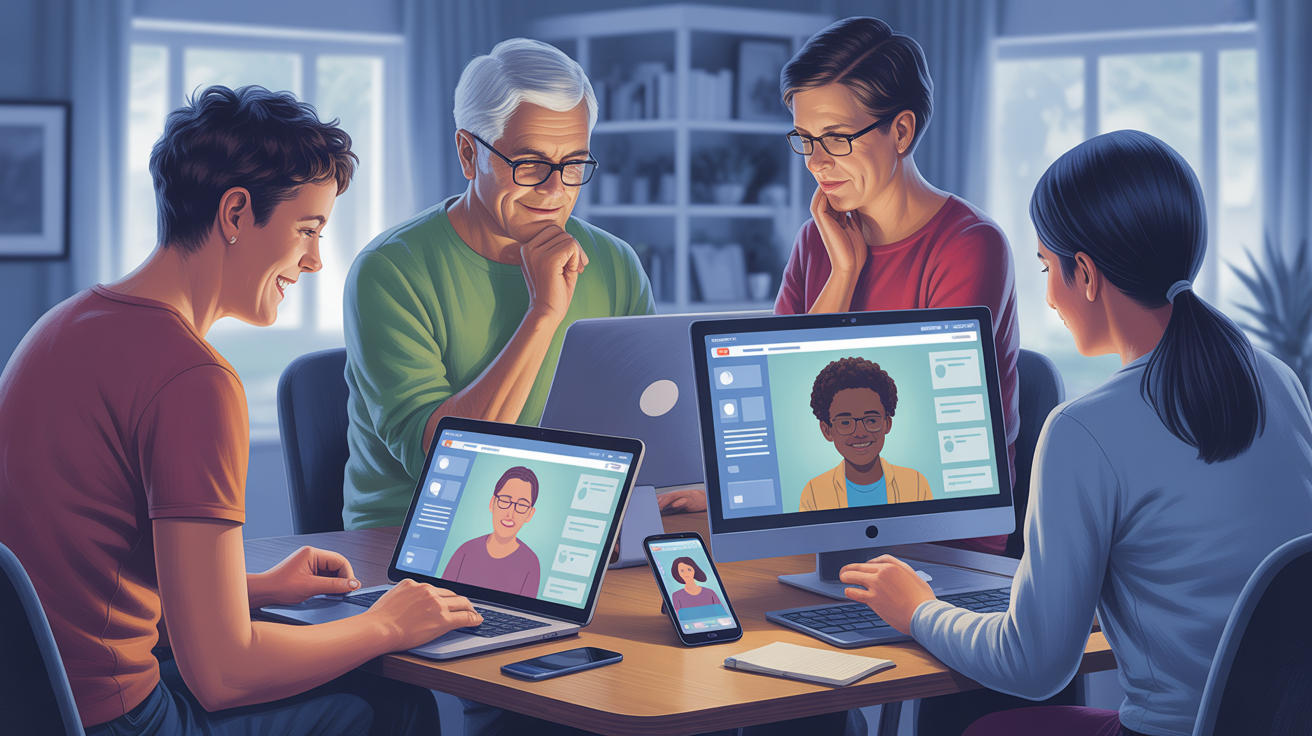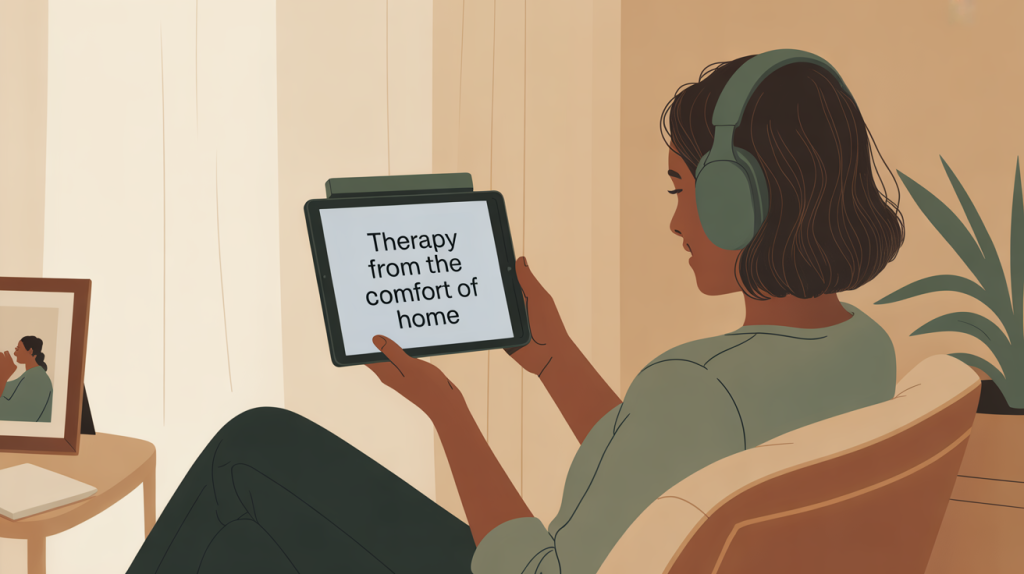In recent years, the demand for mental health support has surged globally. Factors such as increasing stress levels, isolation, economic uncertainty, and the ongoing effects of the COVID-19 pandemic have spotlighted the need for accessible and effective mental health care. Enter online therapy—a transformative solution in the field of mental health counseling that is reshaping how individuals seek and receive support.
What Is Online Therapy?

Online therapy, also known as teletherapy or e-therapy, involves delivering psychological services through digital platforms. This can include video calls, phone sessions, text messaging, emails, and even app-based therapy solutions. Licensed therapists and counselors use secure platforms to conduct sessions, enabling clients to receive professional support from the comfort of their homes.
The rise of Online therapy has made mental health care more accessible, convenient, and flexible than ever before. It removes many of the barriers traditionally associated with in-person therapy, such as transportation, scheduling conflicts, stigma, and geographic limitations.
How Online Therapy Works
Online therapy typically starts with selecting a platform or provider. Clients may choose from a range of services, such as Talkspace, BetterHelp, or private practices that offer telehealth options. After registering and completing an intake form, individuals are matched with a licensed therapist based on their needs and preferences.
Sessions can occur in real-time via video or phone, or through asynchronous communication like messaging. Most platforms use encrypted software to ensure privacy and confidentiality, in compliance with regulations like HIPAA (Health Insurance Portability and Accountability Act) in the United States.
Therapists offer services similar to those provided in traditional therapy, including:
- Cognitive Behavioral Therapy (CBT)
- Dialectical Behavior Therapy (DBT)
- Mindfulness-based approaches
- Trauma-informed counseling
- Grief, relationship, and career counseling
Benefits of Online Therapy
1. Accessibility and Convenience
Perhaps the most notable benefit of online therapy is its accessibility. Individuals in rural or remote areas—where therapists may be scarce—can access mental health care without the need to travel long distances. Moreover, clients can schedule sessions during evenings or weekends, or find therapists across time zones that suit their schedules.
2. Reduced Stigma
Despite increasing awareness, mental health stigma still deters many from seeking help. Online therapy offers a level of anonymity and privacy that may encourage those hesitant about in-person counseling to finally reach out. It allows individuals to receive support without fear of judgment from their community or workplace.
3. Comfort and Familiarity
Being in a familiar environment—like your home—can help clients feel more at ease during sessions. This comfort may foster a stronger therapeutic relationship and enhance openness, which is crucial to the healing process.
4. Flexibility in Communication Styles
Online therapy provides various communication options, including live video, phone calls, and even messaging. For some clients, particularly those with anxiety or social discomfort, text-based therapy can be a less intimidating and more manageable way to express themselves.
5. Cost-Effectiveness
Online therapy often costs less than in-person therapy. Many platforms offer subscription models, sliding scales, or packages, making it financially viable for more individuals. It also eliminates expenses like transportation, child care, and time off work.
Challenges and Limitations

Despite its many advantages, online therapy is not without challenges. It’s important to understand the limitations to make informed decisions.
1. Technological Barriers
Not everyone has reliable internet access or comfort with digital tools. Technical glitches during sessions can disrupt the therapeutic process, and privacy can be a concern for those who live in shared spaces.
2. Limited Non-Verbal Cues
Therapists rely heavily on body language and non-verbal communication to assess their clients’ emotional states. In video or phone sessions, these cues can be harder to detect, potentially affecting the depth of understanding.
3. Unsuitability for Severe Cases
Online therapy may not be suitable for individuals experiencing severe mental health crises, such as psychosis, suicidal ideation, or those requiring immediate medical intervention. In these cases, in-person or emergency services are more appropriate.
4. Licensing Restrictions
Therapists are licensed by state or country, and licensing laws can limit their ability to treat clients across borders. This can restrict the availability of suitable therapists depending on location and legal jurisdiction.
Who Can Benefit from Online Therapy?
Online therapy is well-suited for individuals dealing with:
- Anxiety and depression
- Stress and burnout
- Relationship and family issues
- Grief and loss
- Life transitions
- Low self-esteem
- Mild to moderate trauma
It also serves populations such as students, professionals with busy schedules, parents with limited free time, and individuals with mobility issues.
Making Online Therapy Work for You
To get the most from online therapy, consider the following tips:
1. Choose a Licensed Therapist:
Ensure your therapist is certified and licensed in your jurisdiction. Read reviews, ask questions, and verify credentials before beginning therapy.
2. Set the Right Environment:
Create a private, quiet space for your sessions. Use headphones and secure your internet connection to ensure privacy.
3. Be Consistent:
As with in-person therapy, consistency is key. Attend sessions regularly, complete any suggested exercises, and remain committed to the process.
4. Communicate Openly:
Share your thoughts about how the sessions are going. A good therapist will welcome feedback and adjust their approach to better meet your needs.
5. Explore Supplementary Tools:
Many platforms offer guided journaling, mood tracking, meditation apps, and other digital tools that complement therapy. These can enhance your progress and self-awareness.
The Future of Mental Health Counseling
The pandemic may have accelerated the adoption of online therapy, but its staying power lies in the fundamental changes it brings to the mental health landscape. With advancements in technology, virtual reality, AI-driven assessments, and digital mental health tools, online therapy is poised to become an integral part of modern mental health care.
As acceptance grows, hybrid models—combining online and in-person sessions—are becoming more common, giving clients the best of both worlds. Insurance companies are also expanding coverage for telehealth services, making therapy more accessible than ever.
Conclusion
Online therapy is revolutionizing the way mental health counseling is delivered. By breaking down barriers of distance, time, stigma, and cost, it provides an essential lifeline to those who might otherwise go without care. While it may not replace traditional therapy entirely, it offers a valuable, flexible, and effective alternative.
As we continue to prioritize mental health as a core component of overall wellness, online therapy stands out as a modern solution tailored to meet today’s challenges. Whether you’re facing a specific issue or simply seeking personal growth, online therapy opens the door to healing—one click at a time.
Would you like this tailored for a specific audience, such as teens, professionals, or a clinical setting?





















